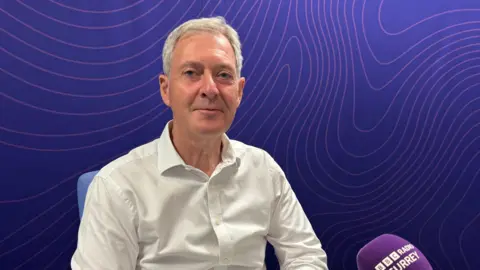Five takeaways from council leader in hotseat
 BBC
BBCSurrey County Council leader Tim Oliver has been in the hotseat on BBC Radio Surrey.
He has been the leader of the council since 2018, and is a Conservative councillor for the Weybridge division. In 2024, Oliver was awarded an OBE for services to local government.
In a wide-ranging interview on Wednesday, he fielded questions from BBC Radio Surrey Breakfast presenter James Cannon.
Here are five takeaways from what he had to say…
1. Community boards
Tim Oliver has been leading the proposal by Surrey County Council (SCC) to have two new unitary authorities when local government is reorganised.
Most of the borough and district councils have said that there should be three instead and there is a fairly robust debate about the issue.
One of the ideas is to set up 'community boards' in areas which do not already have a town or parish council, to allow people to have more of a say locally on how services are run.
Not everyone is convinced. For example, the leader of the Liberal Democrats at SCC, Paul Follows, has described them as "unelected community boards which will have no legal standing, no powers and will basically be talking shops".
But Oliver told BBC Radio Surrey it was ultimately about how these bodies are set up.
"If you give them powers and responsibilities and money, then they will be effective and that's absolutely key that that happens," he said.
2. Reigate & Banstead and Crawley plan 'a surprise'
Another proposal is for a merger of Reigate & Banstead Borough Council and Crawley Borough Council.
Again, that concept has not gone down well with some. Tandridge District Council, for example, has rejected the plans.
Oliver said it came as a surprise.
"It came out of the left field," he said.
"It was raised very early on in the conversations and then it went very quiet. I think all...the other 11 councils were very surprised to see a submission was put in."
3. Writing off council debt
A lot of the concerns being raised are about what would happen to the debt owed by councils in Surrey when local government is transformed.
For example, Woking Borough Council, which effectively declared itself bankrupt in 2023, is estimated to have more than £2bn of debt, although it says the government has agreed to help "aid the reduction".
Oliver said there was "active conversation" with ministers and the request would "always be" that the money should be written off.
"I'm not going to ask my residents in...my division or indeed any resident in Surrey to pick up the debt of those councils," he said.
"The government will have to step in and they will have to write it off."
The Ministry of Housing, Communities and Local Government has been approached for a comment.
4. Fixing the roads and utility works
When members of the public are asked what service they would like to see dealt with, they will, more often than not, talk about potholes and the amount of utility roadworks.
It is a problem which Oliver said that he recognised.
He said there were issues with the impact of weather on the roads and the current amount of money being spent by the council and the government to fix them, which he said was "not enough."
"The real issue is around utility companies and we have 88 interventions...every single day in this county and that is where you see all these temporary traffic lights going up," he said.
He has called for greater powers to prevent firms digging up roads and said ministers had now agreed to set up a working group, which will include SCC.
Previously Streetworks UK, the trade association for utilities companies, had said it was "engaging constructively with highways authorities" across the country, while the government has also said it was taking action.
5. 'National challenge' on special educational needs
One of the biggest pressures on SCC is providing support to children who have special educational needs and disabilities (SEND).
The support being provided by the service has been criticised by parents, as well as the six Liberal Democrat MPs in Surrey.
Oliver, who has previously apologised to families, said there was a "national challenge" and that the number of children with additional needs, including mental health issues, had increased "exponentially", particularly since covid.
"We have 15,000 children in this county that have an education health and care plan," he said.
"I absolutely understand, as a parent, that parents want the best for their children...there are times when we can't actually give the parent what they ask for."
Oliver said he acknowledged there were people who were struggling with the system and SCC was trying to do its best to help them.
Follow BBC Surrey on Facebook, and on X. Send your story ideas to [email protected] or WhatsApp us on 08081 002250.
